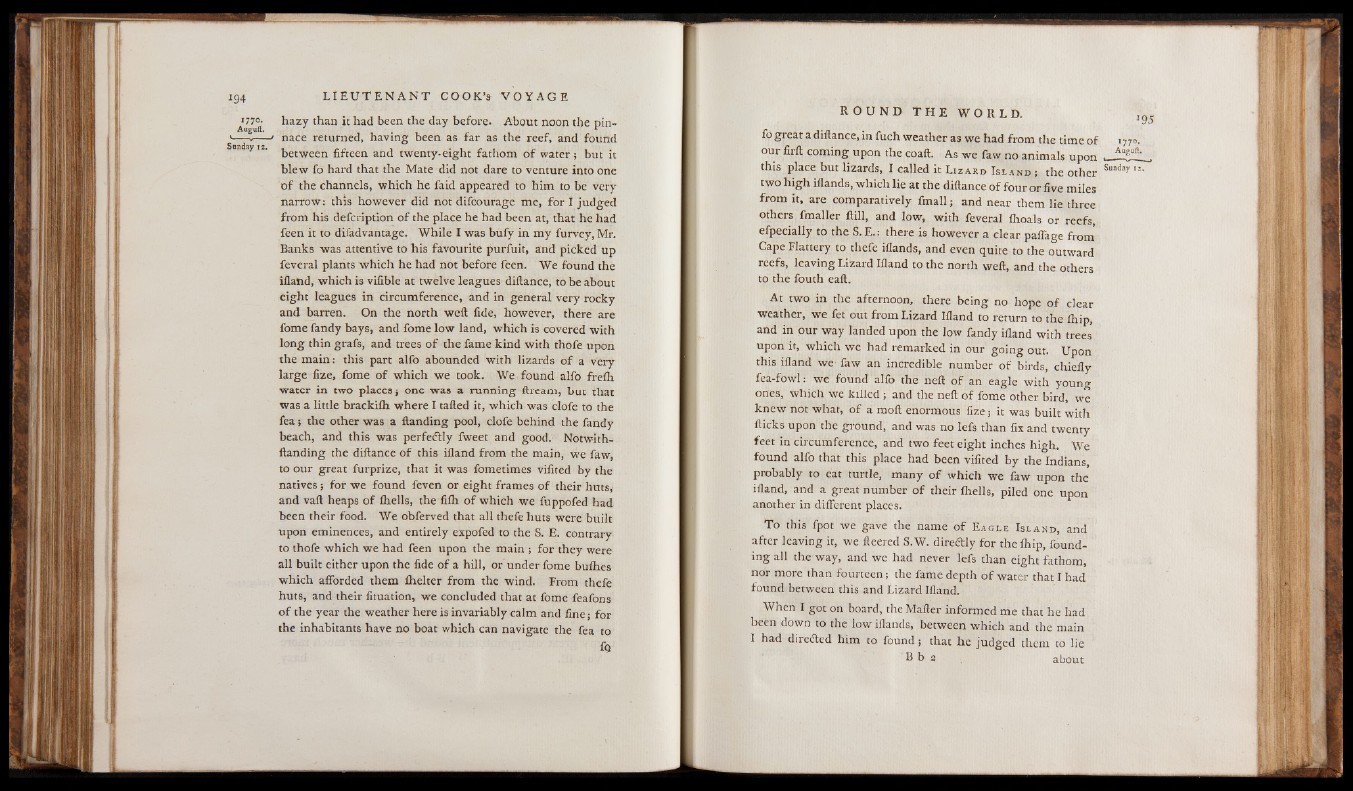
194 L I E U T E N A N T CO O K’s V O Y A G E
•77°. hazy than it had been the day before. About noon the Din-
Auguft. . r
>----.---- f nace returned, having been as far as the reef, and found
Sundayiz. gfteen and twenty-eight fathom of water; but it
blew fo hard that the Mate did not dare to venture into one
of the channels, which he faid appeared to him to be very
narrow: this however did not difcourage me, for I judged
from his defcription of the place he had been at, that he had
feen it to difadvantage. While I was bufy in my furvey, Mr.
Banks was attentive to his favourite purfuit, and picked up
feveral plants which he had not before feen. We found the
iiland, which is vifible at twelve leagues diftance, to be about
eight leagues in circumference, and in general very rocky
and barren. On the north weft fide, however, there are
fome fandy bays, and fome low land, which is covered with
long thin grafs, and trees of the fame kind with thofe upon
the main: this part alfo abounded with lizards of a very
large fize, fome of which we took. We found alfo frefh
water in two places; one was a running ftream, but that
was a little brackiih where I tailed it, which was clofe to the
fea; the other was a Handing pool, clofe behind the fandy
beach, and this was perfectly fweet and good. No twit h-
ftanding the diftance of this iiland from the main, we faw,
to our great furprize, that it was fometimes vifited by the
natives; for we found feven or eight frames of their huts,
and vaft heaps of fhells, the filh of which we fuppofed had
been their food. We obferved that all thefe huts were built
upon eminences, and entirely expofed to the S. E. contrary
to thofe which we had feen upon the main ; for they were
all built either upon the fide of a hill, or under fome bulhes
which afforded them fhelter from the wind. From thefe
huts, and their fituation, we concluded that at fome feafons
of the year the weather here is invariably calm and fine; for
the inhabitants have no boat which can navigate the fea to
fq
R O U N D T H E WORLD. i95
fo great a diftance, in fuch weather as we had from the time of 1770.
our firft coming upon the coaft. As we faw no animals upon ■
this place but lizards, I called it L i z a r d I s l a n d ; the other S“°day ,2‘
two high illands, which lie at the diftance of four or five miles
from it, are comparatively fmall; and near them lie three
others fmaller Hill, and low, with feveral Ihoals or reefs,
efpecially to the S.E.: there is however a clear paffage from
Cape Flattery to thefe illands, and even quite to the outward
reefs, leaving Lizard Iiland to the north weft, and the others
to the fouth eaft.
At two in the afternoon, there being no hope of clear
weather, we fet out from Lizard Iiland to return to the Ihip,
and in our way landed upon the low fandy iiland with trees
upon it, which we had remarked in our going out. Upon
this iiland we faw an incredible number of birds, chiefly
fea-fowl: we found alfo the neft of an eagle with young
ones, which we killed ; and the neft of fome other bird, we
knew not what, of a moll enormous fize; it was built with
Hicks upon the ground, and was no lefs than fix and twenty
feet in circumference, and two feet eight inches high. We
found alfo that this place had been vifited by the Indians,
probably to eat turtle, many of which we faw upon the
iiland, and a great number of their fhells, piled one upon
another in different places.
To this fpot we gave the name of E a g l e I s l a n d , and
after leaving it, we fleered S. W. dire&ly for the Ihip, founding
all the way, and we had never lefs than eight fathom,
nor more than fourteen; the fame depth of water that I had
found between this and Lizard Iiland.
When I got on board, the Mailer informed me that he had
been down to the low illands, between which and the main
I had directed him to found; that he judged them to lie
B b 3 , about